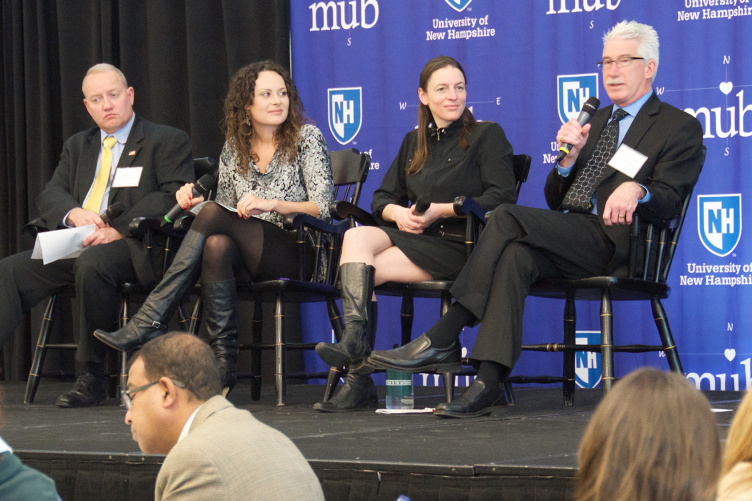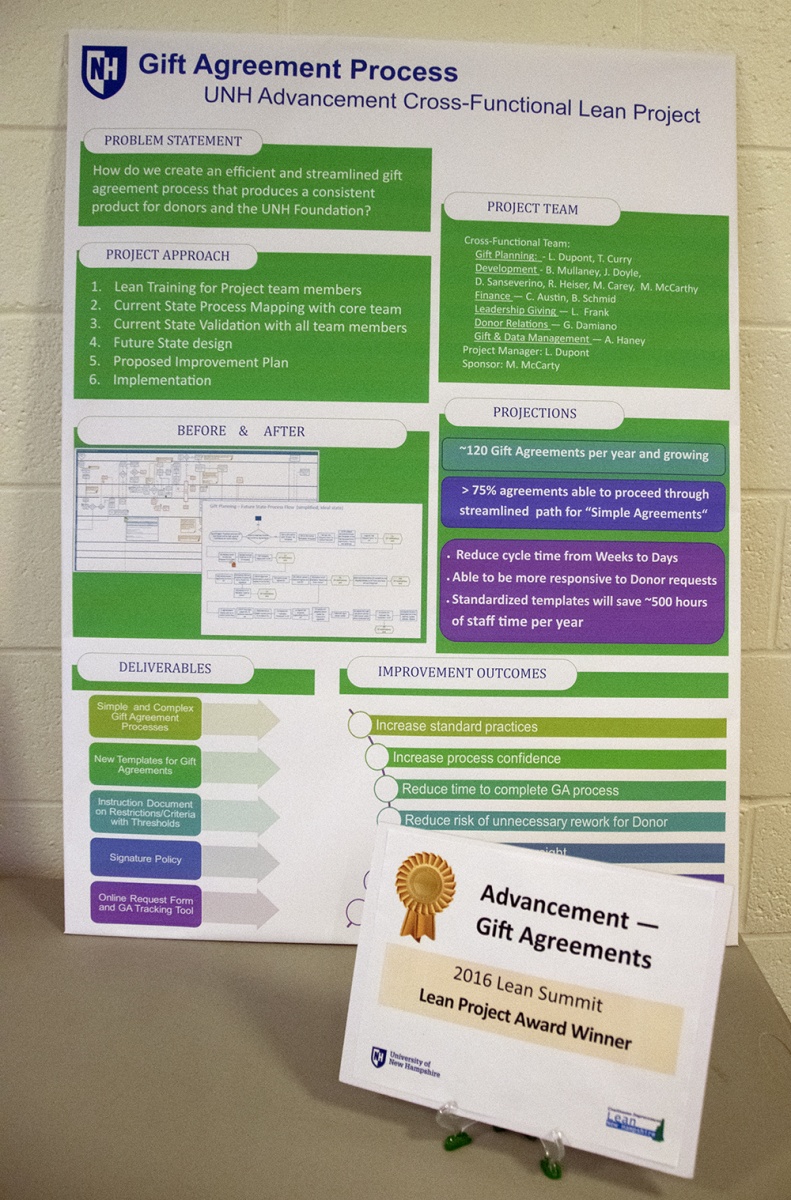
UNH Chief of Police Paul Dean, Bonnie A. Baker of Martin's Point Health Care, Amanda Grappone Osmer of Grappone Automotive Group and Denis Goulet, commissioner of the state’s Department of Information Technology, took part in a panel discussion during the 2016 Lean summit, Change Counts.
Imagine saving millions of dollars in just a couple of years, honoring employees’ creativity and improving customer service. UNH and other organizations that have embraced Lean are doing just that.
That was the message that came through loudly and clearly when UNH and the New Hampshire Lean Network presented Change Counts, the state’s fourth Lean summit, on March 4.
“We have pulled together examples of savings using Lean and other process improvements to the tune of $1.5 million in about two years,” Paul DeMello of UNH’s IT Project Management Office explained prior to the event.

UNH faculty and staff have “engrained in their DNA” the importance of finding ways to improve processes, streamline and save money, he added.
According to Lean.org, Lean’s primary focus is on maximizing “customer value while minimizing waste. Simply, lean means creating more value for customers. A lean organization understands customer value and focuses its key processes to continuously increase it.”
That commitment was highlighted during a Change Counts panel discussion moderated by Vicki Quiram, commissioner of the state’s Department of Administrative Services, and featuring UNH Chief of Police Paul Dean, Bonnie A. Baker of Martin's Point Health Care, Amanda Grappone Osmer of Grappone Automotive Group and Denis Goulet, commissioner of the state’s Department of Information Technology.
“Lean breaks the mental ice jam in your head,” Dean told the packed-house crowd in the Granite State Room, “and everyone’s ideas begin to flow.”
Grappone Osmer added that Lean provides the framework for organizations to “honor the creativity of the people who are doing the work.”
Describing the success his team had with Lean in revising the way UNH handles emergency and curtailment notifications, Dean said part of why he is passionate about Lean is because he went into the process not expecting it to be such a success.
Now, he explained, “Everybody’s interested in what else we can do with Lean because it really works.”

The summit also included opening remarks by UNH CIO Stan Waddell, a gallery of Lean projects from UNH and across the state, networking, a tabletop Lean workshop and closing remarks by Chris Clement, UNH vice president of finance and administration.
Looking to the future, DeMello said that while the UNH community is already putting Lean into practice each day, “What is not in everyone’s DNA is capturing and reporting those successes,” adding, “We need to be very transparent and show we are good custodians of the resources we receive.”
There are innumerable examples of ways UNH is using Lean to innovate and create savings. Among them is the revision of the university’s websites through a collaborative process across departments that ultimately provided better customer satisfaction and reduced costs.
Then, there’s the new way the university deals with electronic waste such as monitors, keyboards and computers that have ceased to function properly or become obsolete.
In the past, there was one day every other month when such items would be collected for proper disposal through the IT department. Now, IT works with departments to collect more than 30 percent of the equipment in advance and stores them until the next disposal day, allowing for flexibility, improved use of employee time and a smoother transition all around.
Questions about Lean? Click on “Contact the PMO” on the UNH Lean website or follow Lean at UNH on Twitter @UNHLean.
“Part of Lean thinking is to look at issues from the perspective of ‘what does a Utopia look like?’ and ask how we can do that with an absence of restrictive thinking,” DeMello explained.
As vice president of finance and administration Clement put it, Lean process improvement is about removing non-value-added steps from a "process" to make it more streamlined and efficient. "LEAN is assisting UNH in reducing waste, saving time and ultimately controlling costs so these benefits can be passed on to our students,” Clement said.
Intro to Lean training takes place at UNH on March 17. Register here.
To learn more about Lean and process improvement or share your process improvement stories, please visit UNH's Lean website.
-
Written By:
Jennifer Saunders | Communications and Public Affairs | jennifer.saunders@unh.edu | 603-862-3585


















































